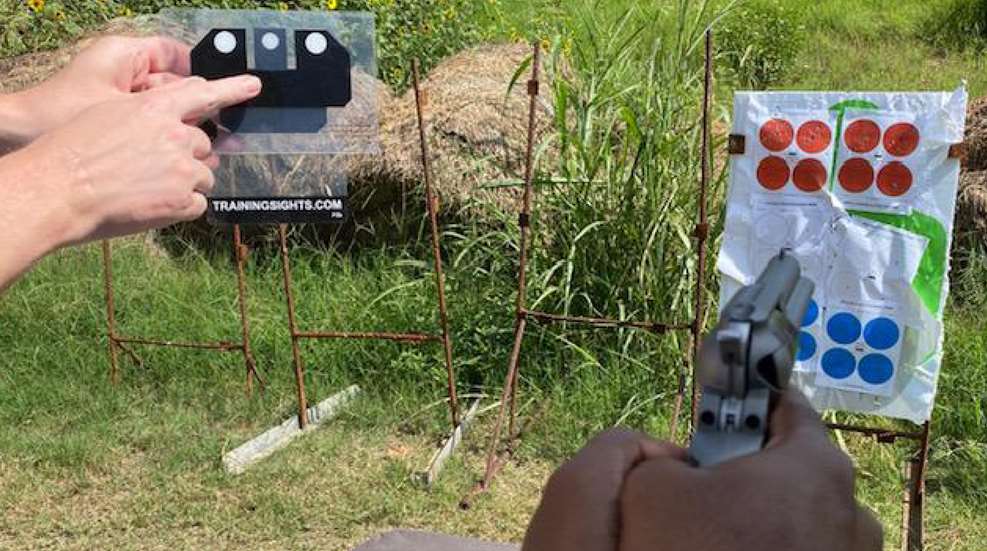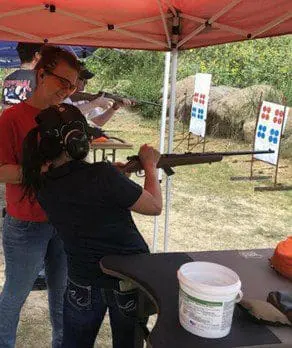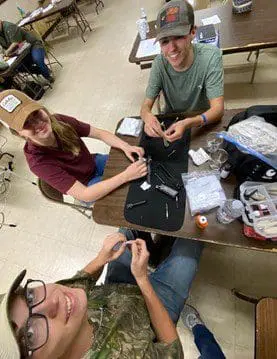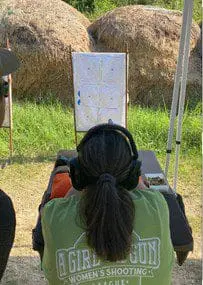8 Essentials for Effective Firearm Training
Tags: NRA, Training, NRA Women, Instructor

8 Essentials for Effective Firearm Training – NRA Women.com
By understanding the requirements for effective training, the instructor can be a more effective teacher.
Many people are knowledgeable on a particular subject, but not everyone is a good teacher. Think back to all the instructors you have had in your life. Some were knowledgeable, just bad teachers. All instructors aim to be a good teacher, but some just do not possess the proper skills. By learning and understanding the eight requirements for effective training, there is room for improvement for most instructors. These eight essentials are: desire, need, learning by doing, individual situations, experience, relaxed environment, variety, and guidance.
Desire
For there to be effective training, a student must have a desire to learn. This is not always the case. If you are a trainer, you are sometimes faced with a paradox. Firearm training can be expensive, so the assumption is that each student wants to be there and is excited about learning. But that’s not always the case. Despite having paid the fee to attend your class, they may not have a desire to be there. It’s possible the class you are offering is simply a stepping stone for them to reach another goal. For instance, individuals looking to become certified to teach the class for an open or concealed-carry permit in their state must first obtain the NRA Pistol Instructor Certification.

If a student lacks the desire to learn, you can change his attitude by motivating him to learn. Are you doing the bare minimum and offering a training course only to rubber-stamp the certification, or are you hoping to motivate your students to seek continuing education? A good instructor can motivate students to want to learn. You need to ask yourself whether your classes are stagnant, continuing to offer the same information as it did a year or two ago. Instructors must also have the motivation and desire to learn, as this quality can naturally motivate students.
Need
Students learn only what they believe they need to learn about any given subject. An instructor must provide all materials, training aids and information in such a way that they provide an immediate learning moment. Teach a topic thoroughly without over-instructing. Let the students guide the discussions. Do this by listening to their thoughts, type of questions they ask, and reading their facial expressions. We have all seen the “deer-in-the-headlights” look from our students at one time or another. Your students will let you know when you successfully did your job teaching a topic.
The NRA stresses the importance of the approach, “This is what you do. This is how you do it. And This is why you do it.” Get straight to the point without beating that proverbial dead horse. Give your students that information they need to understand the topic and how to perform a task, then move on.
People Learn by Doing
You can effectively teach your students any skill by utilizing the NRA’s concept of Total Participant Involvement (TPI). This is done through discussion, practicing a skill, and the proper use of training aids. First, keep your discussions on topic. It is easy to find yourself allowing one of your students to go down a rabbit hole. If you find the discussion is heading off-topic, gently steer it back on course. If you notice a student not engaging in a discussion, without singling them out, ask the student directly questions that cannot be answered with a “yes” or “no.”
When you have thoroughly discussed and demonstrated a skill, request your students to model what you are doing. Training aids are very helpful in getting your students to gain proficiency with a skill. Remember, students learn best by doing an activity, and hands-on learning is the best.
Individual Situations
All scenarios offered in your firearms training courses must be presented in a realistic world view. Actual situations help the students relate to the topic. Your classes are not a forum for you, the instructor, to have a captive audience to brag about your exploits or the things that you have done. This does nothing but label you as a braggard and your students will soon tune you out.

For example, it is not uncommon for family units to seek out an NRA Rifle Instructor to improve their skills before hunting season. You can offer a more personalized class by asking a few questions about the family’s hunting experience. If all of their hunting is going to be local, then use local examples. Do not start talking about your African safaris unless the students take you in that direction through discussions or question.
Previous Experience
Many individuals may have already formulated their own ideas about how to teach a topic, and may be in the habit of rejecting anything that they feel is contrary to their way of teaching. It is the instructor’s job to demonstrate and convince prospective training candidates that the NRA’s method is the best method for beginner success. This is why the NRA invests so much time to ensure that the individuals who become NRA Instructors are the industry “Gold Standard.”
If the NRA instructor does his or her job properly, even the most hard-headed candidate sees the benefit to the NRA’s training method. I have had many individuals enter the class with the attitude that they already know how to teach and believe that they will learn nothing from the class. As the instructor, you have two ways of dealing with this type of student. You can become just as bull-headed as they are and clash for the next eight to 10 hours, or you can look at is as a challenge and win the debate with sound teaching techniques. I choose the latter and I have never failed to get the most stubborn student to agree that the NRA’s method is the best way to teach a beginner shooter.
If you ever get that student that will not concede and makes comments such as they will continue to teach “their” way and not the way they were just trained, you as an instructor have another option. You can fail them and not recommend them to become an NRA instructor. Students can fail for having a bad attitude, failing to demonstrate the NRA’s method of training, or any other reason you think that they will not live up to the “Gold Standard” of instructors that the NRA expects. As an instructor, you need to document, document and document. If you can back up your decision, the NRA will support you.
Relaxed Environment
Individuals learn best in a relaxed environment. Instructors should strive for a structured, yet informal and comfortable atmosphere. This allows for camaraderie and fellowship. When students are having fun, they are encouraged to engage in discussions and ask questions. I have conducted many classes that were attended by people who did not know each other. During the class they became friends and kept in touch. I later found out that many of these individuals remained in contact with each other and some even started teaching together!

Encourage class members to have fun. As an instructor, you can do this by appreciating everyone as unique and finding out what each person can contribute to the class. You also need to appreciate everyone’s opinions and viewpoints. This allows all your students to become vested in the class and it also allows them to take ownership in it.
Variety
As an instructor, have a variety of approaches and training methods to keep your students engaged. Some students are visual learners, some are auditory, and some are tactile. Tailor your training to match your audience. If you have different ways of teaching the same topic, you have more of a chance to reach everyone in the class. Change up your style, use different examples, and have a variety of training aids to deliver your message.
The best way to keep your class fresh is to not get caught in a rut. If there are other instructors in the area, see if you can sit in and monitor how he or she teaches. You can also keep checking the websites of gun, ammunition, and optics manufacturers and read their latest articles and watch their latest videos for new ideas. One of the best places to keep up with the latest trends and teaching techniques is to follow this website for the latest articles.
Guidance
Focus on guidance and assist your students so they have a positive experience. Always be encouraging and congratulatory instead of criticizing and demeaning. Exams are an important tool to evaluate students to determine if training has taken place, but they are also an evaluation of the instructor to verify if he or she has done their job. Do not just hand out a test, pass or fail a student, then file them away.

This is an opportunity for the instructor to see where he or she may be lacking in content delivery and failing to educate the students. For example, if a majority of your class misses the same question, maybe it is not the lack of knowledge of the students but poor presentation of subject matter by the instructor. The instructor should use this as a way to self-evaluate and either spend more time on a topic or find another way of presenting it.
By understanding the eight requirements for effective training, the instructor can be a more effective teacher. People are all unique with a variety of backgrounds and experiences. It is important to teach to your students and not at your students!
